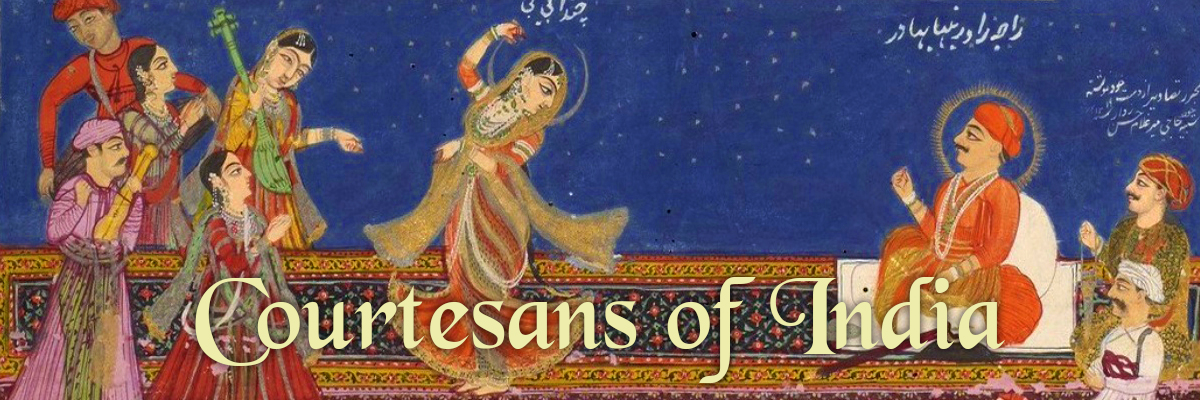“Cast Off All Shame” features a wandering singer who, rather than hide her body as per the rules of decorum, enters a crowded marketplace without care for her covering. Although not written by a courtesan, the poem touches upon shame, modesty, and (women’s) religious devotion, and we have thus included it here for its thematic relevance to the study of courtesans in India.
Vira Sarang’s Translation
This translation can also be found in Women Writing in India: 600 B.C. to the Present and read online at the Women In World History section of the Centre for History and New Media Website.
Cast off all shame,
and sell yourself
in the marketplace;
then alone
can you hope
to reach the Lord.
Cymbals in hand,
a veena upon my shoulder,
I go about;
who dares to stop me?
The pallav of my sari
falls away (A scandal!);
yet will I enter
the crowded marketplace
without a thought.
Jani says, My Lord
I have become a slut
to reach your home.
Janabai
- She is one of the best known Varkari saint-poets. (Varkari is a religious movement within the bhakti spiritual tradition of Hinduism.)
- She spent her life as a low-caste maidservant, not a devadasi, but we include her poem here for its thematic relevance to the study of devadasis (performance, sexuality, gender, religious devotion.)
- “Jani” appears to be a semi-autobiographical figure who appears throughout Janabai’s poetry in scenarios that are both realistic (e.g: doing housework) and metaphorical (e.g: having her hair brushed by Vitthal, a Hindu god, such as in “Help Celebrate the Festival of the Powerless.”)
- Although it predates the organized feminist movement of the modern period, Janabai’s poetry centres women’s issues and especially women’s work.
- Page 82 of Women Writing In India, Vol 1.: “[Janabai’s] poems also embody the dream of the Jodi, or the hope of a perfect companionship to comfort her in her loneliness. It is in the love she has for God that Janabai can imagine and reach out toward a freedom and a power her life could hardly have provided for her.”
Terms
- Veena: an Indian string instrument.
- Pallav: the loose, scarflike part of a sari, draped across the front of the body. The pallav falling away without the speaker caring suggests a rebellion against cultural standards of modesty and decorum.
Interpretive Notes
- What about the speaker’s actions would be considered “selling herself” or being a “slut?” The performance? The act of being in a public marketplace? The immodest dress?
- Consider this quote from Dr. Dorothy Jacobsh’s article, “Bhakti Women and Poetry”:
“Female poet-saints also played a significant role in the bhakti movement at large. Nonetheless, many of these women had to struggle for acceptance within the largely male dominated movement. Only through demonstrations of their utter devotion to the Divine, their outstanding poetry, and stubborn insistence of their spiritual equality with their contemporaries were these women reluctantly acknowledged and accepted within their ranks. Their struggle attests to the strength of patriarchal values within both society and within religious and social movements attempting to pave the way for more egalitarian access to the Divine.” - Is the speaker actively selling herself, or is she casting off shame and, by extension, being viewed by others as selling herself (and criticizing that view)?
- Why would selling oneself or becoming a “slut” help a person to reach the Lord? What was impeding her from reaching God before?
- Consider Dr. Dorothy Jakobsh’s interpretation: “Shedding these bonds of respectability, she is left with nothing. In essence, there is nothing standing between her and her beloved Vithoba.”
- Consider the three overarching themes of praise, public performance, and women’s sexuality. Do you think the poem appears to be mocking the cultural tendency to equate performance to prostitution or embracing it? What does Jani’s newfound closeness to God, having been achieved by “becoming a slut,” say about courtesans and devadasis, if anything? Note that the struggles of a 14th-century low-caste dasi and a 14th-century devadasi should not be conflated, but rather connected—the latter, in Janabai’s lifetime, would likely live with relative prestige.
- Though it predates the organized, modern movement of feminism, this poem articulately challenges gendered double standards that are relevant even today. Do these criticisms confirm, deny, and/or otherwise inform the common Western stereotype of the oppressed Desi woman? How?
Works Cited Within This Annotation
Jakobsh, Dorothy. “Bhakti Women and Poetry.” Brewminate, 29 Jan. 2017, www.brewminate.com/bhakti-women-and-poetry/. Accessed 5 Sept. 2017.
“Bhakti Poets: Poem, Janabai.” Women in World History, n.d, www.chnm.gmu.edu/wwh/p/189.html. Accessed 5 Sept. 2017.
